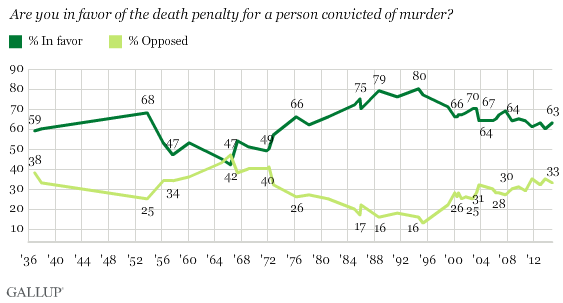In February 2015, Pennsylvania issued a moratorium on executions. In May, Nebraska became the 19th state, and the seventh state since 2007, to abolish the death penalty. And weeks ago, the Connecticut Supreme Court ruled the death penalty unconstitutional, saying “…this state’s death penalty no longer comports with contemporary standards of decency and no longer serves any legitimate penological purpose.”
Nevertheless, states have executed 19 prisoners so far this year—15 of them killed by the states of Texas and Missouri alone. Texas, Missouri and Florida accounted for 28 of the 35 people executed in 2014. In contrast, 23 states and the federal government have not executed anyone for at least the past ten years.
There’s been quite a turnaround from the late 1980s and early 1990s when leaders opposed to the death penalty were afraid to speak out against it. At that time polls indicated that about 80 percent of Americans favored capital punishment while only 16 percent opposed it. The polls are better today, but, at least on the surface, Americans still favor the death penalty by a margin of two to one.

Despite these polling numbers, there is reason for opponents of the death penalty to feel comfortable with their position on this issue. According to the Gallup Poll, Americans have had a strong change of heart when asked “Do you feel that the death penalty acts as a deterrent to the commitment of murder, that it lowers the murder rate, or not?”
Year YES, does NO, does not
2011 32 64
2006 34 64
2004 35 62
1991 51 41
1986 61 32
1985 62 31
Research indicates there are two arguments that move Americans on this issue: (1) it doesn’t work, and (2) it’s killing innocent people.
Americans now agree with 88 percent of the country’s top criminologists who, as noted in a study in the Journal of Criminal Law and Criminology, do not believe that the death penalty is a deterrent.
The same Gallup Poll asks “How often do you think that a person has been executed under the death penalty who was, in fact, innocent of the crime he or she was charged with – do you think this has happened in the past five years, or not?” Over the past ten years, about 60 percent have said that yes, an innocent person has been executed within the past five years while about 30 percent say that has not happened.
Again, most Americans have their facts straight. At last count, since 1973, 155 prisoners on death row have been exonerated. Although it is impossible to know how many innocent people have been executed, the Death Penalty Information Center offers a list of ten whose innocence seems probable.
Opponents of the death penalty can follow their consciences while simultaneously arguing from a strong moral and factual position: that we should instead spend society’s time and money on policies that actually reduce crime and make law-abiding Americans safer.